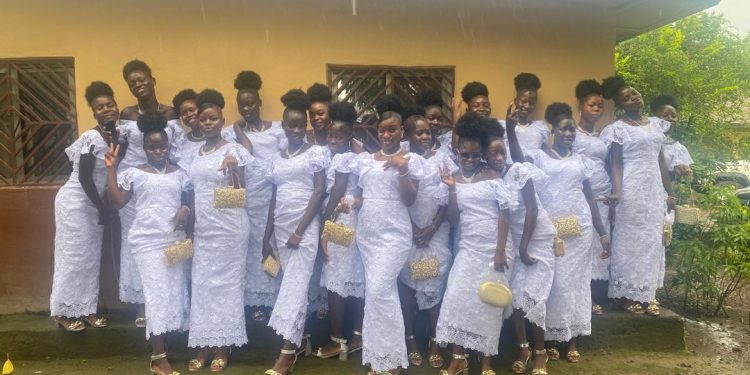By Ragan M. Conteh
In a significant milestone for women’s health and rights in Sierra Leone, 20 women graduated from a bloodless Bondo initiation in Moyamba District.
The ceremony is led by Praise Foundation through the Forum Against Harmful Practices (FAHP).
This alternative rite of passage marks a historic moment in the fight against Female Genital Mutilation (FGM) in Sierra Leone.
To honour this achievement, the FAHP Executive Secretary, Madam Aminata Koroma, and her team visited the grave site of Madam Yoko in Moyamba Township, paying tribute to the founder of the Bondo society in Sierra Leone.
Madam Yoko, a formidable figure in Sierra Leone’s history, played a pivotal role in empowering women through the Bondo society.
However, today, her legacy is being redefined, as the harmful practice of FGM—a key part of traditional Bondo rituals—faces increasing resistance for its negative health implications on women and girls.
Speaking at the grave site, Madam Koroma emphasized the importance of honoring Madam Yoko’s contributions while also protecting the health and well-being of today’s women and girls. Through the support of Irish Aid, FAHP successfully piloted the first-ever Alternative Rite of Passage in Moyamba District, which saw 20 women undergo the traditional Bondo processes, but without the practice of genital mutilation.
“This is a historic moment,” Madam Koroma remarked. “The Moyamba people have embraced a stress-free Bondo, one that maintains our cultural identity but without the harmful elements of FGM. We call on other districts to follow suit and join us in this movement to protect the next generation of women.”
The ceremony was not only a cultural success but also a significant public health milestone. The harmful effects of FGM have long been documented in Sierra Leone, where an estimated 86.1% of women aged 15-49 have undergone the procedure, according to the United Nations Population Fund (UNFPA). The health consequences of FGM include severe pain, excessive bleeding, infections, childbirth complications, and even death. For young girls, the trauma can lead to lifelong psychological damage and stigmatization. The bloodless Bondo alternative offers a path towards the preservation of cultural traditions while eliminating these life-threatening health risks”.
The Paramount Chief of Kaiyamba Chiefdom, PC Foday Momoh Kulama, hailed the initiative as a turning point for the district. “This new beginning resonates with the need to end harmful practices against women and girls,” he said. “We are introducing a safer culture, one that will continue to unite women and provide them with opportunities for education and empowerment.”
The head of the Soweis (traditional Bondo leaders) in Kaiyamba Chiefdom also expressed her support for the bloodless Bondo. “All the girls have gone through the traditional Bondo processes and can now make their own decisions as full-grown women—without the need for FGM,” she said. “Since we began Bondo, this is the best ceremony we’ve had. It has been stress-free, cost-free for parents, and fully supported by our partners.”
This shift in attitude among traditional leaders and community elders is crucial for the long-term success of FGM eradication efforts. As more women join the bloodless Bondo, the momentum builds for widespread adoption of safer rites of passage across the country.
Elizabeth Bangura, a focal person from Praise Foundation, which played a key role in organizing the event, highlighted the importance of protecting underage girls and ensuring that they can make informed decisions about their bodies. “Among the 20 graduates are university students and secondary school students. We ensured that none of them were minors,” she said, underscoring the foundation’s commitment to safeguarding girls from harmful practices.
Health data from Sierra Leone paints a stark picture of the dangers posed by FGM.
According to a 2019 report from UNICEF, 83% of girls aged 0-14 in the country have undergone FGM. This practice not only jeopardizes physical health but also contributes to high maternal and child mortality rates. Sierra Leone has one of the highest maternal mortality rates in the world, with 1,360 maternal deaths per 100,000 live births, often exacerbated by complications arising from FGM.
In light of this, the bloodless Bondo ceremony offers a beacon of hope for a healthier future. Women like Elizabeth Bangura and other activists are paving the way for a new generation of empowered women who can pursue education and leadership roles without the threat of harmful traditional practices holding them back.
FAHP and its partners remain committed to expanding the bloodless Bondo model to other regions of Sierra Leone. “This ceremony is just the beginning,” said Praise Foundation’s Director, Martin Moriwai. “We are transforming lives in Moyamba, and we hope to bring this safer cultural practice to more women and girls across the country.”
Paramount Chief Foday Momoh Kulama and other local leaders have pledged their support to the movement. The Chiefdom Speaker of Kaiyamba Chiefdom also echoed the call for more education on the dangers of FGM, emphasizing the need for community engagement and awareness.
The Forum Against Harmful Practices, Praise Foundation, and other stakeholders are urging the government, international donors, and the Sierra Leonean people to continue supporting bloodless Bondo and other initiatives aimed at safeguarding women and girls. Together, they aim to put an end to FGM and create a safer, more equitable future for all.











